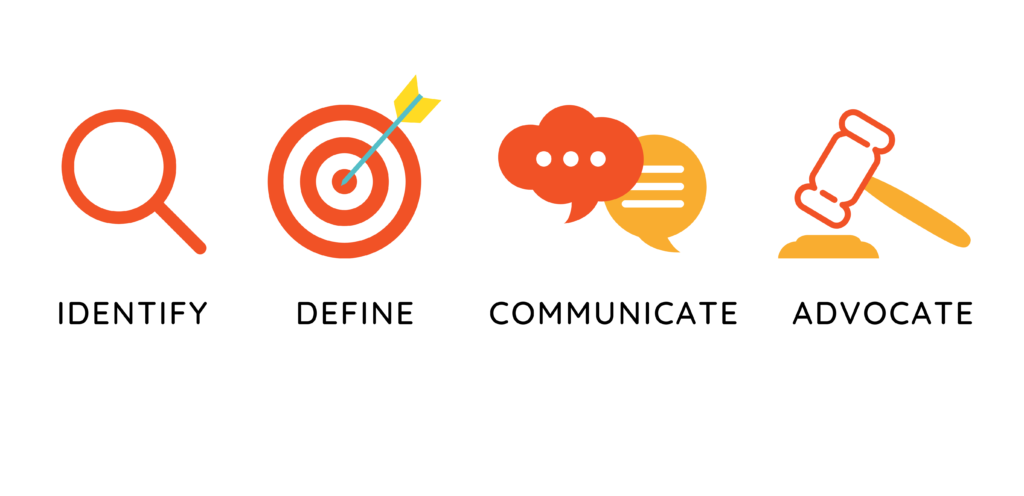We all have experienced a moment when someone made a nasty comment about us. Instead of approaching and telling them how unpleasant their comment made us feel, we chose to remain silent. Yep, been there too. Boundaries or limits – we all have them. Most people have ideas about what is acceptable to them and what is not. However, we hardly stop and reflect on the boundaries we have. Consequently, boundaries then live in our minds only and when a situation occurs that requires us to speak up, we rather shush than saying something. Or we say something when someone has been pushing our buttons five times. Too late. Getting insight into your boundaries, being able to state them to others, and knowing what the possible consequences might be beforehand, makes you an empowered person. So, that is what we are going to work on today because who doesn’t want to feel empowered? Grab a paper and coloured pens and let us start writing! You can download the workbook or use a notebook that is near you.
What are boundaries? Why are they important?
Some people are a bit doubtful about setting boundaries because they view it as a way of pushing people away. I believe that setting boundaries keep the wrong people out, people who don’t respect you and your boundaries, and the right people IN, people who respect you and your boundaries.
“A boundary is a limit or space between you and the other person; a clear place where you begin, and the other person ends . . . The purpose of setting a healthy boundary is, of course, to protect and take good care of you” (IPFW/Parkview Student Assistance Program, n.d.).
Setting healthy boundaries is an important part of self-care. A lack of boundaries and the inability to state them can cause you to feel angry, resentful, stressed, or frustrated about the way people treat you. Boundaries are often psychological, emotional, and physical. The coronavirus is a great example of a physical boundary. Some people really wanted to keep their distance, while others continued giving hugs or kisses. Other types of boundaries are sexual, time and material. For example, what are you willing to share with others, can others borrow your car, who are others (friends, family, neighbour, colleague), and how should they use your car? What do you expect? Should they return the car refueled and parked in front of your house? Reflecting on these questions will make clear to you what your boundaries are. Healthy boundaries lead to good mental and emotional health, developed autonomy, and developed identity.
There are four steps to setting boundaries successfully:

Let us quickly move to exercise 1.
Exercise 1: Identify
Emotions are your compass in this exercise. No need to hide from them! Answer the following questions.
- What situations have you experienced in the past that made you feel angry, resentful, or stressed? (If it helps you can create categories for yourself e.g., work, romantic relationship, friendship, family relationship, health, parenting, financial)
- Why did these situations make you feel like that?
- What are your core values? What are the ingredients for a stable and peaceful life in which you can be your authentic self?
- What are the threats to you living your life peacefully?
- Have you observed other people around you who are good at setting boundaries? How do they behave? What do they say?
Exercise 2: Define
- Write down your ideal outcome of a situation or your ideal life vision based on the core values of exercise one.
- Use the threats of exercise one to define your boundaries. (If you have done this per category it can look like this: work – my workdays are from 9.00-17.00 PM. The weekend is me time and I won’t work in the weekend even if I see that my colleagues work in the weekend. This is good for my health. Social relationships – people who think it’s okay to appear and disappear when they want to have a negative effect on my mental wellbeing. I respect myself in such a way that I will not tolerate this type of behaviour.)
- Now think of actions you have control over that can influence the ideal outcome/life vision. What can you do or say to facilitate the ideal situation? (Responses that can be prepared, actions that should continue or stop, conversations)
Exercise 3: Communicate
Yes, it is time to practice your assertive skills. Writing out a transcript for possible future events is handy because you are prepared. Of course, you cannot do this for every situation. Some events are just well… surprising. But at least you have some killer sentences ready for when someone is trying to step over your boundary. Here is a formula for every situation that requires you to be assertive:
- Describe how you feel about a situation or people’s behaviour using ‘I’ statements.
- I (pregnant) feel unheard when I express that smoking at home is not good for our baby.
- I feel unimportant when you appear and disappear in my life.
- Express what you need/want.
- I want our baby to grow healthily and for that, I need you to smoke outside the home during our pregnancy.
- I would like for you to be a stable factor in my life.
- State consequences (can be positive or negative)
- If you are unable to do that, I will do what is best for our baby and live with X until the baby is born.
- This will make me feel like I matter to you and augment moments of joy as I enjoy being in your presence. For that extra assertiveness, you can add [If you are unable to be stable in your behaviour towards me, I will have to reconsider whether I still want to see you.] But my advice is to wait after the first sentence to see what they reply. Sometimes people have no clue how their behaviour is interpreted by others.
Exercise 4: Advocate
Once you’ve communicated your limits to others, people need time to get used to your limits. There comes a moment when they will cross your limit. So, what do you do? How are you going to react?
- Think of ways that people will step over your boundaries. How can you recognize it?
- Write down how you will react. Will you ignore it the first time and say something the second time? Will you say something subtle the first time? Or will you immediately act?
- Practice how you will reply.
- If people cannot treat you in way that you want, it is sometimes better to let them go. You deserve to be respected, heard, and seen. Experience has taught me that people who genuinely care for you stick around when you express your feelings. They are open for a conversation, they listen, they will tell you that they are apologetic for how their behaviour hurt you, and they will do their best to not behave like that again.
Setting boundaries can be difficult. It will take time to identify, define, and state your boundaries. Once you have set a boundary, you need to honour it. If you don’t honour it, others won’t either. A vague boundary is always better than no boundary. Boundaries = self-respect. Be patient and give yourself time to become more experienced in setting and stating boundaries.

